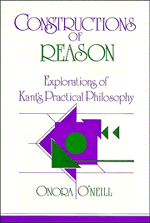8 - Kant after virtue
Published online by Cambridge University Press: 05 June 2012
Summary
Intelligibility and rationality
It is always fun to see somebody saw off the branch on which he is sitting; but if we are on the same branch, we may worry about where the landing will be. Alasdair Maclntyre's After Virtue is gripping reading for anybody interested in the prospects for an objective ethics. MacIntyre appears almost to sever the possibility of such an enterprise. He diagnoses modern moral discourse as deeply fragmented, condemning us to “interminability of public argument” and “disquieting private arbitrariness” (p. 8). Liberal pluralism, with its agnosticism about the good for man, is only a genteel and halfhearted expression of a Nietzschean position (pp. 112 and 240). The crucial intellectual move by which this predicament – the unexpectedly sour fruit of the Enlightenment project – was reached was the rejection of “a moral tradition of which Aristotle's thought was the intellectual core” (p. 110). But the transition has not been merely intellectual: The fragmentation of modernity is patent in innumerable aspects of our social and cultural lives.
Yet Maclntyre does not intend to undercut the possibility of practical reasoning. He holds that the Nietzschean view that “all rational vindications of morality manifestly fail” (p. 111; cf. p. 107) is (despite its “terrible plausibility” [p. 238]) necessarily inconclusive (Chap. 9 and pp. 239–41). The targets of Nietzsche's destructive arguments are those very thinkers of the Enlightenment whose writings are based on a rejection of Aristotelianism.
- Type
- Chapter
- Information
- Constructions of ReasonExplorations of Kant's Practical Philosophy, pp. 145 - 162Publisher: Cambridge University PressPrint publication year: 1990



